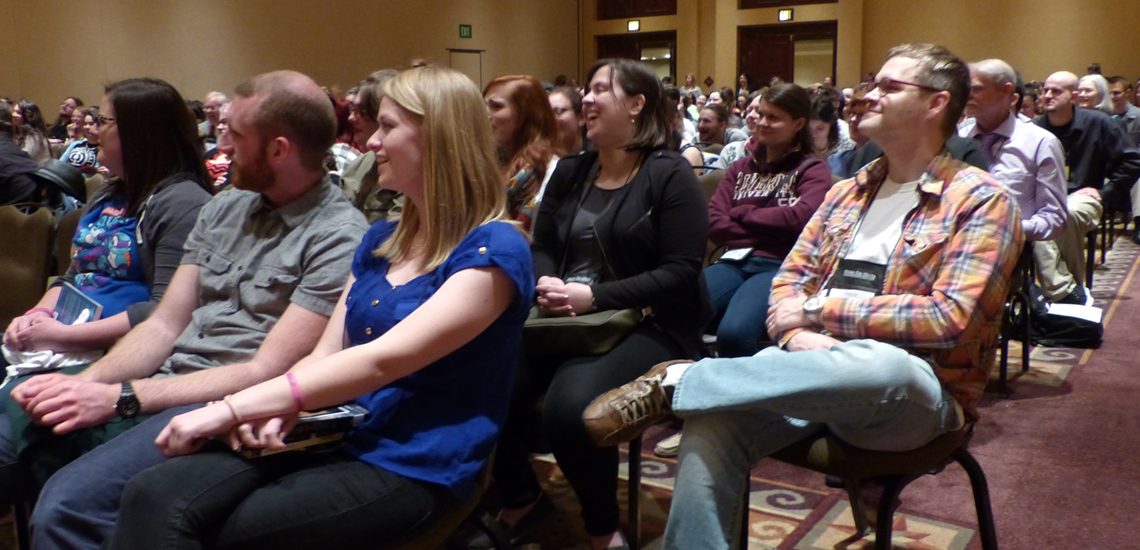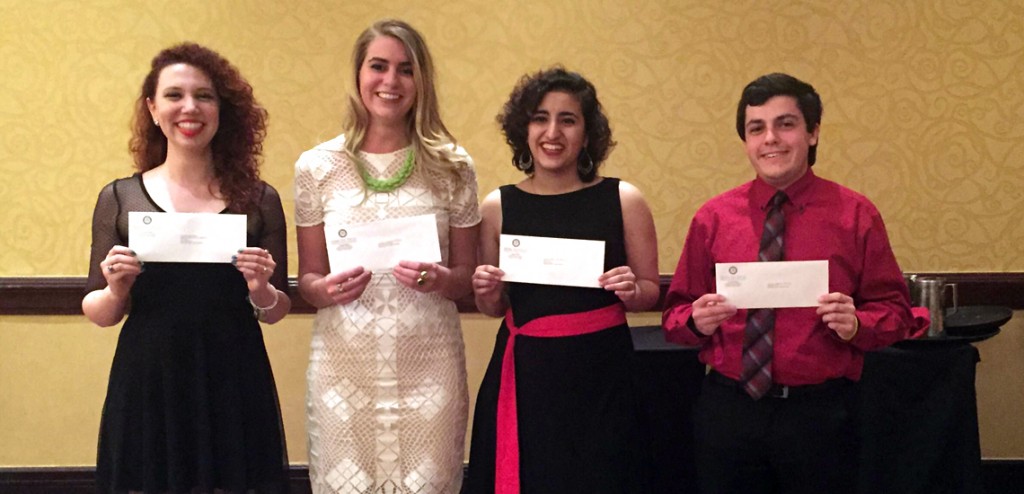 by Diane Steinberg
by Diane Steinberg
2016 Convention Chair
“Of course you should submit!” is the short answer to that question, and this blog post is the long answer to that question.
Any Sigma Tau Delta member who can come to convention ought to come to convention. Convention is a great English nerd festival, with literature lovers from around the world; contemporary authors; advice on future opportunities, scholarships, internships and awards; and an energy that comes from a thousand young minds at work and at play.
While attending convention and serving as a volunteer can be great fun, presenting your own work is the icing on the cake. Your audience of fellow Sigma Tau Deltans is a kind one, so questions about your paper presentation are designed to elicit an illuminating and friendly discussion. The Sigma Tau Delta convention is an excellent early-in-one’s-career conference presentation, with smart, appreciative listeners.
 What papers can you expect to hear at convention? About one third of the paper sessions are for creative works: collections of original poetry, original short fiction (or excerpts from longer works of fiction), collections of original flash fiction, original dramatic scenes, and original creative non-fiction essays are presented as options in all of the break-out sessions. Creative writers can spend the entire four days of the convention immersed in the works of other young writers. My repetition of “original” here is deliberate—some of the work submitted for convention is breath-taking in its power and originality, and will be some of the very best undergraduate verse and fiction you ever will hear.
What papers can you expect to hear at convention? About one third of the paper sessions are for creative works: collections of original poetry, original short fiction (or excerpts from longer works of fiction), collections of original flash fiction, original dramatic scenes, and original creative non-fiction essays are presented as options in all of the break-out sessions. Creative writers can spend the entire four days of the convention immersed in the works of other young writers. My repetition of “original” here is deliberate—some of the work submitted for convention is breath-taking in its power and originality, and will be some of the very best undergraduate verse and fiction you ever will hear.
If you are a creative writer, you could look over your portfolio, and make some decisions: poetry? fiction? neither? a collection held together by a title? a single work? You should plan to read aloud for about twelve minutes, and for most writers, twelve minutes translates into just under 2,000 words. A very brief collection—say, 600 words—is likely not to be accepted. And 2,000 words is your maximum for acceptance, with most creative acceptances ranging from 1,200 to 2,000 words in length. Once you have a collection together, make sure you have scrubbed your name (or college or teacher) from the collection, given it a thematic title, and shared it with any reader you admire for comments and feedback. Then, you are ready to submit and to earn the coveted spot of “student presenter” at the Sigma Tau Delta 2016 International Convention in Minneapolis, MN.
Many of you are more comfortable presenting a scholarly essay, and Sigma Tau Delta members will submit scholarly papers on nearly every English-related topic. The convention theme is “Finding Home,” and a few papers will fit under that theme, but most will cover the authors, themes, and genres you’ve read and written about in your careers as students of literature and language. In Minneapolis, you’ll find diverse paper sessions on medieval poetry, Toni Morrison, Shakespeare’s history plays, Russian novelists, and on most other topics you’ve studied.
Eager submitters will look over their papers from this and recent terms and start with one they are proud of. They’ll dust it off, read it over, and return to some of its sources. A good convention paper is aware of itself as a paper to be listened to—not read silently. It will make its main points clearly and succinctly, and will quote sparingly from other critics. Read your selected paper aloud to yourself and listen as if you were not its author. Revise for clarity and conciseness, and think about what information your listeners will need. You are not writing for your professor, but for your fellow scholars.
As with creative submissions, a scholarly essay will be just under the 2,000 word limit (your bibliography and any notes do not count toward the 2,000 words you will read at the convention). In its convention form, it will be leaner and more focused, with briefer quotes, shorter sentences, and few adverbs! A good convention paper makes its main point(s) quickly—its author doesn’t have words to waste on elegant introductions or conclusions that praise Shakespeare’s talent as a dramatist. If your natural writing style is long sentences with many subordinate clauses, revise that down to something easier to understand when it is listened to! The best conference papers are very aware of themselves as a spoken genre.
 Once you have revised to your own satisfaction, you always should ask a strong writer either to read or hear your essay, and take her/his advice seriously. Many chapter sponsors or other faculty members will help you by reading your convention submissions. Your university may also have a writing center, or you simply could ask your fellow chapter members. Scrub your convention submission by cleaning out your name, college, and teacher, and resave it under its new 50 character (or fewer) title.
Once you have revised to your own satisfaction, you always should ask a strong writer either to read or hear your essay, and take her/his advice seriously. Many chapter sponsors or other faculty members will help you by reading your convention submissions. Your university may also have a writing center, or you simply could ask your fellow chapter members. Scrub your convention submission by cleaning out your name, college, and teacher, and resave it under its new 50 character (or fewer) title.
I have had the privilege of reading hundreds of convention submissions, and the best ones have much in common with one another. Their authors have followed instructions about deleting personal identification, about word length, and about clarity and conciseness. They make an interesting point the audience will want to chat about in the Question and Answer session at the panel’s conclusion. They use evidence to support their assertions. Many of these essays will either approach a traditional work in a slightly new way, or introduce a less-well-known literary work to convention attendees. The paper authors are proud of their hard work, and never forget their first public presentation—their first chance to show their skill on an international stage. And that proud feeling of accomplishment is why you should submit.
Submissions are due October 26, 2015, 11:59 p.m. Central Daylight Time (CDT)
Submissions Overview: Who is Eligible and What Can I submit
Convention Awards
Paper Submissions

Submit a comment
Your email address will not be published. Required fields are marked *
There are 1 comments
[…] Should I Submit to the 2016 International Convention? Submissions Overview: Who is Eligible and What Can I submit? Convention Awards […]